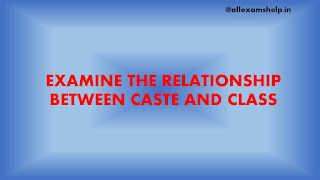Examine the relationship between caste and class
The relationship between caste and class A estate is a social order whose members are assigned a endless status within a given social scale and whose connections are confined consequently.
It's the most rigid and easily graded type of
social position. It has also frequently been appertained to as the extreme form
of unrestricted class system.
Sprucely varied with the estate system, the
open class system ran be placed at the contrary end of a continuum. A social
class has been defined as an abstract order of persons arranged in situations
according to the social status they retain. There are no establishment lines
dividing one order from another.
A social class consists of a number of
individualities who partake analogous status frequently credited at birth but
able of being altered. Class, thus, doesn't correspond of organised
unrestricted groups defined by law or religion as does estate, nor are the
colorful strata in the system as rigid and fluently identifiable.
The
relationship between caste and class Both estate and class emblematize two types of estates of
pastoral society.
There are two approaches
(i) Marxist
( ii) Non-Marxist/
Weberian
Marxists assay position of pastoral India in
terms of modes of product and relations of product. Marxists say that there are
numerous variables but the most important variable is the mode of product.
Non-Marxists or
Weberians feel that position takes place because of three variables.
(i) Wealth
( ii) Power
(iii) Prestige
1. Wealth is defined as capability to produce
or inherit parcels.
2. Prestige refers to recognize and style of
life.
3. Power means the
capability to control over others.
When all these three effects are considered,
the individualities are consequently distributed.
The relationship between caste and class. The position system Involve any quality which
means a group of persons may get further power/ prestige/ wealth or all the
three in combination. Numerous studies have been conducted on the base of
Marxist analysis.
They've given emphasis on
(i) Power of land
(ii) Types of peasants ( i.e. coproprietors,
petty lodgers, landless labours)
. (iii) Types of
technology which is used at the time of product,
.( iv) Labour class.
(v) Quantum of fat at the time of product.
The relationship between caste and class. Sympathizers of Non-Marxist approach consider
class, status and power as the base of social position of pastoral India.
Andre Beteille has conducted a study on
estate, class and power .K.L Sharma has conducted a study on changing pastoral
position system.
In pastoral India,
people are generally linked according to their estate. In South India, vill is
given precedence in relating a person.
CASTE-CLASS NEXUS
Nexus is defined as a set of ties in
connection to the introductory structural and artistic changes.
It indicates
1. Interdependency
between both factors.
2. Contradictions and parallels.
3. Control of one group over the other.
Estate and class nexus implies observation of
two as mutually essential areas. Pressure and contradiction between estate and
class aren't only recognizable but also bring their discriminational
consequences on different gentries and classes. The relationship between caste and class. This nexus between estate and class also
implies going beyond estate and going beyond class in understanding social
reality.
A group of
sociologists give their view that Indian society can be stylish studied from a
estate model. They justify their opinion by saying that estate is an over-reaching ideological system encompassing
all aspects of social life of Hindus, in particular, and the other communities,
in general. The problem, still, is the fact that estate system is veritably
complicated and complex.
The
relationship between caste and class. In connection to estate- class nexus some conclusion can be
drawn
(i) The estate system functions as an
extremely effective system of profitable exploitation.
( ii) The estate scale
is linked with social scale and it reflects power of land.
(iii) Estate determines a definite relation
with the means of product.
(iv)B.R. Ambedkar correctly observed that the
estate system not only divides labour or indicate division of labour but also
divides the entire social structure.
So estate and class represent analogous social
reality but from varying perspectives
For PDF and Handwritten
WhatsApp
8130208920
